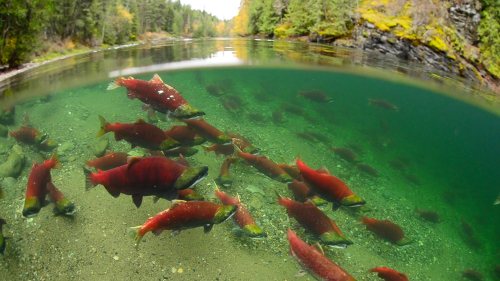Get Outside! Mount Wells
Looking for a place to get outside this Canada Day/Fourth of July weekend? If you’re near Victoria, BC, check out Craig Romano’s write-up of Mount Wells at Cascadia Magazine.
One of the best wildflower hikes in the Capital Regional District on Vancouver Island, Mount Wells also grants some of the area’s best views. Stand atop the worn ledges on this little 1155-foot (352 m) peak west of Victoria, and feast on sweeping views that stretch from Finlayson Arm and the knolled Gowlland Range to Victoria Harbour, the Strait of Juan de Fuca and Washington’s Olympic Mountains.
Don’t be fooled however by this hike’s short distance into thinking this is an easy trail. It’s not. You’ll climb 865 feet (264 m) in less than 1 mile (1.6 km) on steep rocky tread and exposed ledge. The hike can be slick in wet weather and is not recommended for young children. But if you’re sure-footed and looking for an elevated heart rate, carry on!
Read the full article, trail route, and driving directions online now at Cascadia Magazine.
Cascadia Magazine SPECIAL REPORT:
Swanson Occupation: The Battle for Wild Salmon
First Nations on Vancouver Island have been fighting a long battle against open-net fish farms, which they say harm wild salmon. In an investigative report by Mychaylo Prystupa at Cascadia Magazine, meet Hereditary Chief Ernest Alfred, who occupied a cabin on remote Swanson Island for 284 days to call attention to the diseases that biologists say are likely passing on to endangered salmon runs.
.
What BC’s new rules will mean for fish farms in Broughton Inlet
Sarah Cox, in a great feature for The Narwhal, has the best analysis we’ve seen of new rules announced by the BC government for fish farms– and what those changes will mean for First Nations in places like Broughton Archipelago. The timeline of 2022 has many environmental activists worried, but the Broughton is a special case, Cox reports, because of month-to-month permitting.
Want to harass the homeless? Seattle’s got an app for that.
Dae Shik Kim Hawkins, writing for the Atlantic, reports on a disturbing new app available to people in the tech-hub of Seattle: Find It Fix It. Originally intended as a way to address potholes and other infrastructure problems, it’s now being used by those angry at homeless people to report unauthorized encampments. Meanwhile, the Oregonian reports that homeless people were overwhelmingly targeted for arrest last year. And The Tyee notes that youth homelessness is on the rise in Kamloops, BC, and over one fifth relied on sex work to get by.
Oregon gun safety measures likely won’t be on ballot
The day after a gunman killed five journalists in Maryland, the prospects for gun control in Oregon this year have dimmed. A statewide initiative that would have put limits on assault rifles will most likely will not be on the ballot in the fall, reports OPB. Gun interests tied the measure up on court over what the definition of an “assault rifle” is.
A clay used as traditional medicine on BC coast gets attention
In a fascinating report at The Tyee, Steph Eva Wood reports on clay deposits in Kisameet Bay near Bella Bella, British Columbia that have been used as traditional medicine by the Heiltsuk First Nation for centuries–and which is now gaining attention from medical researchers at UBC. It could be a boon to First Nations, but there’s concern that commercial interests won’t harvest the clay in a sustainable manner.
“Leave No Trace,” a new film set in Cascadia
Loosely based on actual events, the new film Leave No Trace tells the story of father and daughter living in a homeless encampment in Portland’s Forest Park. The Stranger reviews the film by Debra Granik (which is based on a novel by Reed College creative writing professor Peter Rock). The Vulture has an interview with Granik, who’s best known for Winter’s Bone.
“The First Stage of Life,” an essay by Celestine Aleck (Sahiltiniye)
Celestine Aleck (Sahiltiniye) of the Snuneymuxw First Nation, has an essay, “The First Stage of Life,” available online at the Salish Sea Sentinel, in which she talks about being an Indigenous single mother helping her teenage son through the transition to adulthood. “I believe that in order for us to have a strong, healthy future, we should make every effort possible to raise our children with the teachings that our ancestors fought so hard to keep alive.” That’s today’s selection of news, arts and culture from the Cascadia bioregion. Have a great Canada Day and Fourth of July weekend. ?? ?? ?? –Andrew Engelson
Photo credits: Sockeye salmon by Tavish Campbell

